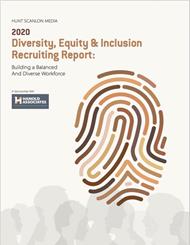Diversity Recruiting . . .What Does That Actually Mean?

August 4, 2020 – Diversity hiring and recruiting is accelerating in importance and is an expanding focus for many organizations. Diverse organizations have many benefits in terms of perspectives, talent and culture, according to Steven Landberg, managing director of Claymore Partners, in a new report. But what does diversity mean for an organization and recruiting? “In my experience, it varies dramatically between organizations currently and has for a long time,” he said.
“When I moved back to the U.S. from Singapore in the mid 1990s after having been the only white male in most of my meetings as a regional person, it meant African-American and women,” Mr. Landberg said. “When I was in Asia diversity meant many other characteristics of national backgrounds, religion and ethnicity. In the U.S., the definition of diversity was broadened to include other minority persons since then. Interestingly, for a global IT services firm that I do searches for, diversity has also meant Caucasian candidates as they have largely Asian employees.”
 2020 Diversity, Equity & Inclusion Recruiting Report:
2020 Diversity, Equity & Inclusion Recruiting Report:
Building a Balanced and Diverse Workforce
Hunt Scanlon Media’s latest market intelligence recruiting report – this time focused on Diversity, Equity & Inclusion – will be available later this fall! The nation’s top executive recruiters are resetting expectations and looking for new ways forward to build balanced and diverse workforce teams for their clients.
According to executive recruiters, DE&I should not just be a priority, but an integrated part of every company’s leadership goals. Some companies have even tied DE&I metrics to executive compensation. But it’s more than that.
Part of building strong, diverse hiring teams means asking yourself: “Who is my company culture going to attract – and how will it engage people who are here?” This question can be very difficult to answer if you assume everyone feels welcome already just because you do. Fostering diversity, equity and inclusion within organizations is more than just the right ethical decision. “It is one of the best business decisions a company can make,” said Keri Gavin, a partner with Hanold Associates and leader of the search firm’s Global Diversity, Equity & Inclusion practice. Hanold Associates is a proud sponsor of this year’s report. This report will help organizations prioritize DE&I as a business imperative that drives greater competitiveness, innovation and business results. Get it now!
“The challenge for executive search firms to pursue diversity candidates is frequently finding them with the types of experience an organization is seeking,” said Mr. Landberg. “Frequently, there is a limited amount of experienced diversity candidates in select functions or industries. Recruiting diverse entry level candidates is a different challenge and tends to have a greater ability to hire in line with diversity goals.”
Diversity Goals
Diversity goals for many organizations continue to be African-Americans and women. Yet some organizations also view diversity in terms of other racial groups, sexual orientation, and age, Mr. Landberg said. Should geography also become a diversity goal to gain additional insights and perspectives with the growth or remote workers? What about diversity of your suppliers/vendors? Diversity of age and experience? Board, senior management, managers and contributor diversity?
 Steven Landberg is the managing director of Claymore Partners, a boutique executive search firm. He has conducted numerous diversity searches and he always seeks to provide a diverse candidate slate for his client’s consideration. He has worked throughout the U.S. as well as lived and worked in numerous overseas countries during his career. Mr. Landberg has held corporate executive positions (GE, PepsiCo, Citicorp), consulting firm partner roles (Gemini, Answerthink, Nextera), and now executive search for over 12 years.
Steven Landberg is the managing director of Claymore Partners, a boutique executive search firm. He has conducted numerous diversity searches and he always seeks to provide a diverse candidate slate for his client’s consideration. He has worked throughout the U.S. as well as lived and worked in numerous overseas countries during his career. Mr. Landberg has held corporate executive positions (GE, PepsiCo, Citicorp), consulting firm partner roles (Gemini, Answerthink, Nextera), and now executive search for over 12 years.
“In order to strengthen diversity at the senior management level, that requires concerted development efforts within an organization as well as recruiting external candidates,” Mr. Landberg said. “Diversity employees should be tracked, trained, nurtured, mentored and promoted by an organization that desires a diverse senior management team. The organization also needs to establish a culture and working environment that is supportive of those diversity programs. Human resources should establish diversity development and promotion measurement and monitoring including reviewing manager performance in this regard.”
“Diversity is a complicated goal to be defined, refined, measured and strategized as a critical business strategy for success,” said Mr. Landberg. “Once defined, the recruitment and executive search implementation objectives and approaches can be effectively developed.”
Related: Recruiters Up Their Game in Diversity
Diversity recruitment requires being able to identify and pursue the desired candidate profiles for each type of search, Mr. Landberg said. “Communicating those goals overall and for each search is necessary as well as training your recruitment staff is how to be implement those objectives including best practices,” he said. “Monitoring and measuring diversity success as well as challenges is critical for success as well as tying recruitment staff rewards to align with their achievement. Those objectives and measurement also need to be transferred to your search firms when they are employed to obtain talent.”
Commitment to Diversity
“Diversity candidate interviewing should also include diversity interviewers by the hiring organization that further demonstrate an organization’s commitment as well as providing diverse perspectives in the selection process,” Mr. Landberg said. “Diversity interviewers can also share perspectives on the cultural and development challenges for candidates during the process to better enable those candidates to be successful in their entry to the new organization. I believe having diversity interviewers are more critical than diversity internal or external recruiters in not only hiring but having successful careers in your organization.”
 Search Firms Step Up Diversity Recruiting Initiatives
Search Firms Step Up Diversity Recruiting Initiatives
Organizations that unleash the potential of diverse talent innovate faster and see better business results. Executive search firms are no different and have been stepping up their own efforts in diversity. Let’s examine recent initiatives underway at Caldwell, Korn Ferry and Heidrick & Struggles.
So, do you need to use an executive search firm that specializes in diversity recruiting to obtain a diverse, top quality candidate slate? “Using a diversity recruiting firm will enable an organization to potentially have more diverse recruiting firm suppliers, but is not necessarily the best way to obtain a diverse candidate slate,” said Mr. Landberg. “An executive search firm that understands diversity recruitment and has successfully provided desired diverse top candidates is certainly qualified as well as bringing depth of experience in a particular industry or functional area.”
A talented executive search professional will also provide a diversity of candidates in terms of background and experience that can add to the hiring organization that is open to finding top talent to enhance innovation, its culture and diversity. “In fact, when asked to find top women IT sales and account executives last year, I was able to deliver six outstanding women as part of a diverse candidate slate that were then hired and have been successful at their new organizations,” Mr. Landberg said.
So what does diversity recruiting mean to you?
Related: To Improve Diversity, Recruiting Sector Must Set a New Course
Contributed by Scott A. Scanlon, Editor-in-Chief; Dale M. Zupsansky, Managing Editor; and Stephen Sawicki, Managing Editor – Hunt Scanlon Media











